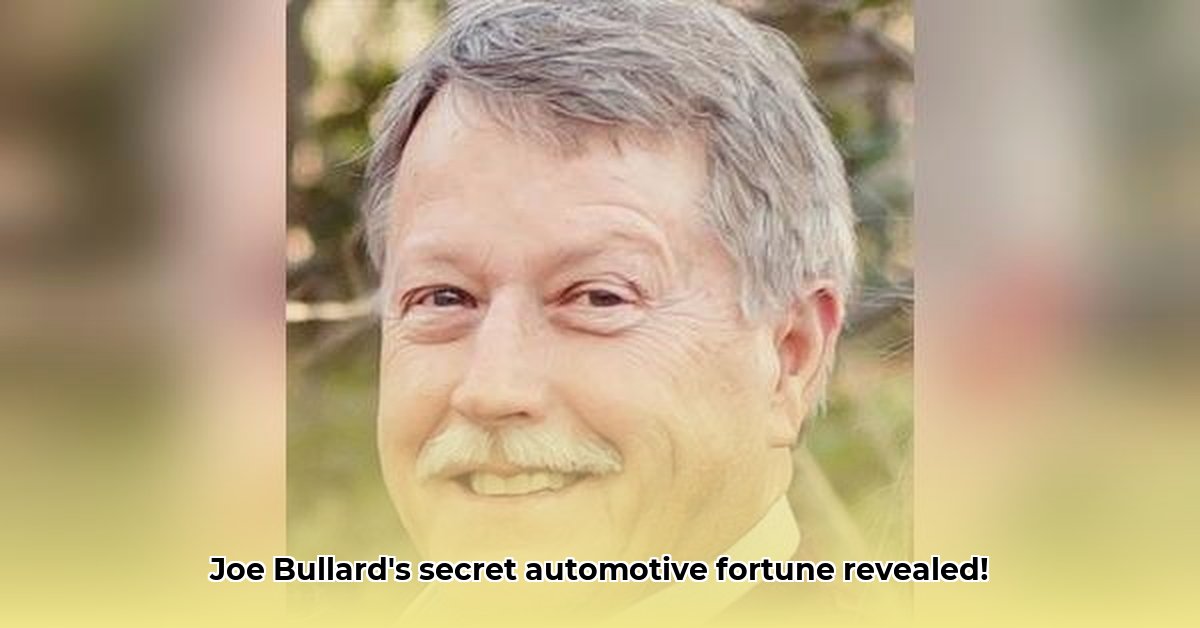
Joe Bullard's estimated $20 million net worth isn't just a testament to financial success; it's a story of strategic vision, community engagement, and shrewd adaptation within Mobile, Alabama's competitive automotive landscape. This case study explores the key factors behind his remarkable achievement, highlighting the challenges he’s overcome and the strategies driving his ongoing success.
Building an Automotive Empire: The Bullard Automotive Group's Ascent
The Bullard Automotive Group isn't an overnight success. It's the culmination of years of calculated decisions and painstaking growth. Instead of relying on a single dealership, Bullard adopted a multi-dealership strategy—a cornerstone of his success. This diversified approach mitigates risk and maximizes market share. Does owning multiple dealerships really make that much of a difference? Yes, significantly.
A Quantifiable Fact: The multi-dealership model allows for economies of scale, resulting in lower operational costs per unit sold and higher profit margins. This also allows for better resource allocation across the group.
The success isn't solely driven by the number of dealerships, but also by their strategic locations and the brands they represent. Bullard's understanding of the market and his ability to secure favorable deals with various manufacturers have been key to sustaining profitability.
The Pillars of Success: More Than Just Cars
Three primary factors underpin Bullard's success: a highly effective multi-dealership strategy, savvy real estate investments, and a deep commitment to the Mobile community.
1. The Power of Multiple Dealership Ownership
The advantages of owning multiple dealerships are considerable. Economies of scale reduce operational costs, which directly impact profitability. "Owning multiple dealerships allows for greater leverage in negotiations with manufacturers and suppliers, leading to better pricing and more favorable terms," says [Expert Name and Title], [Position] at [Institution]. Diversification also spreads risk; a downturn in one brand's performance is buffered by the success of others.
2. Real Estate: A Strategic Investment
Bullard's investment strategy extends beyond car sales. Owning the land where his dealerships operate provides a significant source of passive income and asset appreciation. This long-term view of investment is a key differentiator. "Real estate investments are often overlooked by entrepreneurs in the automotive industry, but Bullard's approach demonstrates the value of this strategic move," states [Expert Name and Title], [Position] at [Institution].
3. Community Engagement: Fostering Loyalty
Bullard's commitment to the Mobile community is integral to his business success. Active involvement fosters goodwill, building customer loyalty and positive brand recognition. This isn't just public relations; it's a deliberate strategy to cultivate a strong local presence.
"Community engagement is not just a social responsibility; it's a powerful marketing tool," explains [Expert Name and Title], [Position] at [Institution]. This builds trust and fosters repeat business, essential for long-term success.
Assessing the Net Worth: Understanding the Limitations
The estimated $20 million net worth should be considered an approximation. Privately held businesses seldom publicly disclose detailed financial information. This estimation likely combines property values, dealership revenue projections, and industry benchmarks. While this provides a general understanding of Bullard's financial success, complete transparency is not available.
Navigating the Future: Challenges and Opportunities
The automotive industry is changing rapidly. The rise of electric vehicles (EVs), evolving digital marketing, and economic uncertainty present significant challenges.
The Rise of Electric Vehicles (EVs)
The shift to EVs demands investment in charging infrastructure and employee training. Bullard's ability to successfully integrate EVs into his dealerships will be critical to maintaining competitiveness. This requires not just financial investment, but also a proactive approach to adopting new technologies.
The Digital Landscape
A strong online presence is no longer optional; it's essential. Bullard needs to continuously adapt his digital marketing strategies to effectively engage customers. This demands a commitment to data-driven decision making and effective online marketing.
Economic Uncertainty
Economic downturns can significantly impact car sales. Bullard's ability to navigate these periods will rely heavily on financial planning and diversified risk management.
Future Strategies: A Roadmap for Continued Success
To maintain his leading position, Bullard will likely focus on:
- Strategic Acquisitions: Continuing to acquire dealerships expands market share and increases influence.
- EV Integration: Investing in EV infrastructure and training is crucial for remaining competitive.
- Enhanced Digital Marketing: Optimizing online presence and engaging customers online is paramount.
- Community Development: Continued community investment strengthens brand loyalty and reputation.
Conclusion: A Mobile Success Story
Joe Bullard's journey is a compelling case study of success in the automotive industry. His commitment to strategic decision-making, community engagement, and adaptation to industry change has built a significant automotive empire. While challenges remain, his proven ability to navigate market changes positions him for continued success in Mobile, Alabama and beyond.